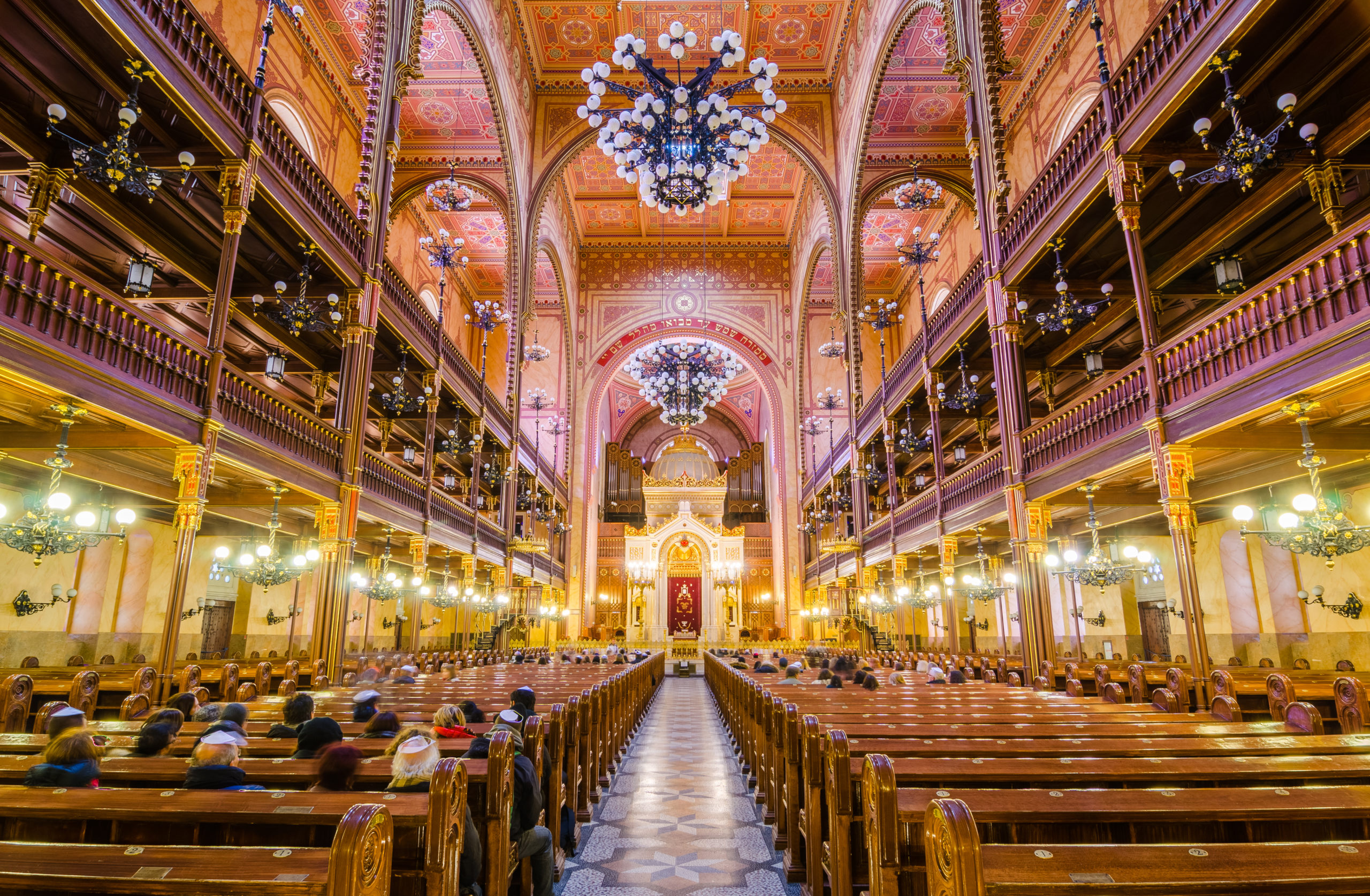Jewish Cultural Quarter (JCK)
The Jewish Cultural Quarter (Joods Cultureel Kwartier) consists of the Jewish Museum, the Jewish Museum Junior, the Portuguese Synagogue, the Hollandsche Schouwburg, and the National Holocaust Museum.
The Jewish Cultural Quarter invites its visitors to acquaint themselves with Jewish culture and history, deepen their existing knowledge, and think actively about the subject of cultural diversity. The basic principle is to make the Jewish story accessible in a positive way to as much of the general public as possible.
- The Jewish Museum (Joods Museum) was founded in 1932 in Amsterdam, Netherlands, with the aim of preserving and showcasing the rich history and culture of the Jewish people in the Netherlands. It is one of the four sites of the Jewish Cultural Quarter. During World War II, the museum was closed by the occupying Nazi forces, and many of its collections were seized or destroyed during this time. After the war, the museum was reopened and has since grown into a leading institution for the study and promotion of Jewish history and culture in the Netherlands. Today, the Jewish Museum’s collection includes over 13,000 objects, artworks, and historical artefacts related to Jewish life and culture, and its exhibitions cover a wide range of topics related to Jewish history and culture Initiatives
- Exhibitions and educational programs: The Jewish Museum regularly hosts exhibitions and educational programs that promote understanding and awareness of Jewish culture and history, including the history of antisemitism and its impact on the Jewish community.
- Partnership with Anne Frank House: The Jewish Museum has a partnership with the Anne Frank House in Amsterdam to promote the values of tolerance and mutual respect. Together, the two institutions offer educational programs and joint exhibitions to educate the public about the dangers of antisemitism and discrimination.
- Partnership with other cultural institutions: The Jewish Museum works closely with other cultural institutions in the Netherlands and abroad to promote intercultural dialogue and understanding. For example, the museum has collaborated with the Rijksmuseum in Amsterdam to host joint exhibitions on Jewish history and art.
- Digitization of collections: The Jewish Museum is working to digitize its collections and make them more accessible to the public. This includes making historical documents and artefacts related to the Holocaust available online, with the aim of promoting awareness and understanding of this dark chapter in European history and the dangers of antisemitism.
- Public outreach: The Jewish Museum regularly engages with the public through social media, events, and other outreach efforts to promote understanding and awareness of Jewish history and culture, and to raise awareness about the dangers of antisemitism and discrimination.
- The Portuguese Synagogue is a historic synagogue located in Amsterdam, the Netherlands. It was built by Sephardic Jews who fled from the Spanish and Portuguese Inquisitions in the late 16th and early 17th centuries and settled in Amsterdam. The synagogue was constructed between 1671 and 1675 and is considered one of the most important Jewish landmarks in Amsterdam. It is also one of the largest synagogues in Europe and has remained virtually unchanged since its construction. They are still active today and promote Jewish Culture. Initiatives
- Hosting religious services: The Portuguese Synagogue is an active place of worship that hosts regular religious services for the Jewish community in Amsterdam. The synagogue also hosts services for special occasions such as weddings, Bar and Bat Mitzvahs, and other life-cycle events.
- Guided tours: The synagogue is open to visitors and offers guided tours in multiple languages that provide an in-depth look at the synagogue’s history, architecture, and cultural significance. Visitors can explore the synagogue’s impressive interior, which includes a large prayer hall, the bimah, and the aron kodesh.
- Cultural events: The Portuguese Synagogue hosts a variety of cultural events throughout the year, including concerts, exhibitions, and lectures on Jewish topics. These events provide an opportunity for the broader community to learn about Jewish culture and heritage.
- Preservation: The synagogue is committed to preserving its historic architecture and maintaining its status as a landmark of Jewish history and culture. This includes ongoing efforts to maintain and repair the building’s intricate wooden interior and other features.
- Education: The synagogue provides educational resources and programming to promote understanding and awareness of Jewish history and culture. This includes educational materials for school groups and other visitors, as well as lectures and other events aimed at promoting interfaith understanding and dialogue.
- Community outreach: The Portuguese Synagogue is involved in a range of community outreach activities, including partnerships with local organizations and initiatives aimed at promoting social justice and combating prejudice and discrimination.
- The Hollandsche Schouwburg was originally built in 1892 as a popular theatre in Amsterdam. However, during World War II, it was used as a detention centre for Jews before they were sent to concentration camps. Over 46,000 Jews were deported from the Hollandsche Schouwburg to concentration and extermination camps, with very few surviving the atrocities of the Holocaust. After the war, the building was converted into a memorial and museum to honour the memory of those who lost their lives during the Holocaust. Today, it serves as a reminder of the tragic events that occurred during World War II and as a testament to the resilience of the Jewish community in Amsterdam. Initiatives
- Commemoration: The museum serves as a memorial to the Jews who were deported from the building during World War II. Visitors can pay their respects to those who perished, and the museum hosts commemorative events throughout the year.
- Education: The museum provides educational resources and programming to promote understanding and awareness of the Holocaust and its impact on Amsterdam and the Netherlands. This includes guided tours, workshops, and other educational materials.
- Collection and preservation: The museum collects and preserves artefacts, documents, and other materials related to the Holocaust in Amsterdam and the Netherlands. The museum’s collection includes photographs, documents, and personal belongings of Holocaust victims and survivors.
- Research: The museum conducts research on the Holocaust in Amsterdam and the Netherlands, and shares its findings with the wider community. This research includes interviews with survivors and their descendants, as well as analysis of historical documents and other sources.
- The National Holocaust Museum is dedicated to commemorating the victims of the Holocaust and promoting understanding and awareness of its historical significance. The museum is housed in four former barracks of the Dutch army and is located next to the site of the former Hollandse Schouwburg, which served as a deportation centre during the Holocaust. The museum’s exhibits focus on the personal stories of individuals who were affected by the Holocaust, as well as the broader historical context and political and social factors that contributed to its occurrence. Initiatives
- Commemoration: The museum serves as a place of commemoration for the victims of the Holocaust, honouring their memory and preserving their stories. The museum houses various exhibits that focus on the personal stories of individuals affected by the Holocaust, as well as artefacts and other materials that illustrate the history of this period. The museum hosts various commemorative events throughout the year, including ceremonies, exhibitions, and educational programs.
- Education: The museum provides educational resources and programming to promote understanding and awareness of the Holocaust and its historical significance. This includes guided tours, workshops, and other educational materials aimed at visitors of all ages. The museum’s exhibits are designed to engage visitors in a thoughtful and reflective dialogue about the Holocaust and to encourage critical thinking and open-mindedness.
- Research: The museum conducts research on the Holocaust and its impact on Dutch society, including interviews with survivors and their descendants, as well as analysis of historical documents and other sources. The museum collaborates with academic institutions and other research organizations to conduct research on various aspects of the Holocaust, and to share its findings with the wider community.
- Community outreach: The museum is involved in a range of community outreach activities aimed at promoting social justice and combating prejudice and discrimination. This includes partnerships with local organizations and initiatives aimed at promoting human rights, as well as programs and events designed to engage diverse communities in a dialogue about the Holocaust and its legacy.
- International cooperation: The museum collaborates with other Holocaust museums and organizations around the world to promote a greater understanding of the Holocaust and to develop strategies for preventing future genocides. The museum participates in international conferences and exhibitions and hosts international visitors and scholars for research and educational programs.
- Joods Monument is an online site part of the Jewish Cultural Quarter. It commemorates the over 104,000 Dutch Jews who perished during the Holocaust. The site provides a multilayered view of the Jewish community of the Netherlands before and during World War II. It is a living archive that invites family members, friends, historians, editors, and visitors to share and document their memories and stories. The homepage lists every Dutch Jew who perished during the Holocaust and places events against a timeline. Each person is represented by a pixel, and visitors can view an individual’s personal profile or conduct more general searches. The Jewish Monument includes all Dutch Jews living in the Netherlands who were persecuted and murdered as a consequence of the Nazi occupation during World War II. Visitors can contribute to the Monument by uploading images and documents, writing new stories, or completing and restoring familial connections. “Together, we can ensure that the Dutch Jews murdered during the Shoah will always be remembered. “
Overall, the Jewish Cultural Quarter is an essential resource for anyone interested in learning about the history and culture of the Jewish people, and it serves as an important reminder of the importance of preserving cultural heritage for future generations. Its institutions are dedicated to promoting understanding, education, and awareness of Jewish history and culture, and they play an important role in promoting social justice and human rights for all people.



 NOA is co-funded by the Rights, Equality and Citizenship Programme (2014-2020) of the European Union
NOA is co-funded by the Rights, Equality and Citizenship Programme (2014-2020) of the European Union